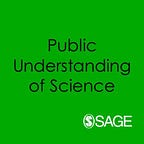Ethics and Practice in Science Communication
Review by Fabien Medvecky
“Good” science communication is often understood as “effective” science communication.
This volume takes a normative turn and invites us to think of “good” science communication in terms of morally or ethically “good”. While it might be tempting to hope for a one-size-fits-all ethical code for science communication, the editors explicitly (and rightly) note that the breadth of what sits under the umbrella of science communication means such a code is an unrealistic aspiration. Instead, this volume offers a more thoughtful, nuanced and considered view of the many ways ethics interacts with science communication.
The book’s first section, How Ethics Matter, presents some overarching issues that go beyond any specific practice or context. Goodwin begins with communication (speech-act theory) to highlight the importance of the audience-communicator relationship, while Paul Thompson begins with ethical tensions (the conflicting aspirations of consequentialism and deontology) to highlight the underlying views that lead to challenges in risk communication. Priest then tackles the long-standing challenge of strategic vs democratic science communication, especially in the case of controversies like climate change. This leads neatly into the next chapter that returns to the idea of democratic science communication. Leah Sprain presents an honest discussion on the inevitability of framing in science communication, and invites the reader to see the benefit of framing for democratic engagement.
The second section, Professional Practice, considers science communication in specific contexts. The section opens with two very different practices (using narratives and communicating about persons), before attention is given to three sets of professionals (journalists, PR professionals, and scientists) and their unique sets of ethical challenges as these more or less intimately intertwine with communication.
The practical focus of this section helps ground the more theoretical discussion of the book’s first section and there is further ‘grounding’ in the final, Case Studies, section of the book, which discusses more subtle ethical challenges. Here, we work through cases on extrapolation from animal studies to humans, personal/consumer genetic testing, agri-biotech and activism, agri-research centres and self-representation, and anthropology and indigenous values.
These case studies do much more than report on specific ethical challenges. They offer both insights into some of the moral complexity of science communication and suggestions for working through those complexities.
If there is one shortcoming to this volume, it is that it lacks a general discussion on ethics, and what this is taken to mean in this context. The introduction to the book included a discussion on foundational science communication (the deficit model and the dialogic turn, the science of science communication, etc.) but, given the likely audience, science communication is probably more familiar territory than ethics.
It is not until the second chapter that some fundamental ethical theories are introduced, and then only deontology and consequentialism (virtue ethics first appears in chapter 6). But that is only a minor drawback. Overall, the flow of the book from broad and conceptual to professional practice to focused case studies invites the reader to dive increasingly deeply into the normative aspects of science communication. This makes for a valuable book, both as a reference book, and as a possible text for advanced undergraduate or postgraduate courses.
No one-size-fits-all ethical code for science communication is offered here and, in my eyes, this is one of the virtues of this book. But perhaps there is a way to conceptualise ethics other than to think in terms of codes. Indeed, this very timely book does show there are important recurring themes in the ethics of science communication, from accuracy and honesty, to authenticity, to an acknowledgment of the epistemic power of science, and these themes may lay the ground for ‘an ethic of science communication’ beyond a code.
How to cite: Medvecky, F. (2018). Book review: Susanna Priest, Jean Goodwin and Michael F Dahlstrom (eds) Ethics and Practice in Science Communication. Public Understanding of Science. https://doi.org/10.1177/0963662518816153
Fabien Medvecky is a Senior Lecturer in Science Communication at the University of Otago, New Zealand. He has a background in philosophy, and works on the role of values, especially ethical and economic values, in science communication. Latest publication: Fairness in Knowing: Science Communication and Epistemic Justice. Science and Engineering Ethics, 24(5), 1393–1408. doi: 10.1007/s11948–017–9977–0
